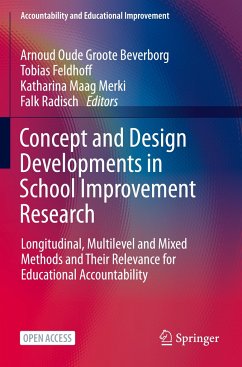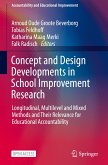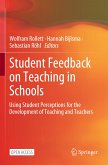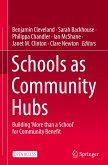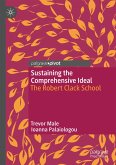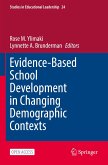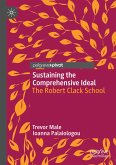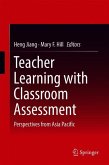Concept and Design Developments in School Improvement Research
Longitudinal, Multilevel and Mixed Methods and Their Relevance for Educational Accountability
Herausgegeben:Oude Groote Beverborg, Arnoud; Feldhoff, Tobias; Maag Merki, Katharina; Radisch, Falk
Concept and Design Developments in School Improvement Research
Longitudinal, Multilevel and Mixed Methods and Their Relevance for Educational Accountability
Herausgegeben:Oude Groote Beverborg, Arnoud; Feldhoff, Tobias; Maag Merki, Katharina; Radisch, Falk
- Broschiertes Buch
- Merkliste
- Auf die Merkliste
- Bewerten Bewerten
- Teilen
- Produkt teilen
- Produkterinnerung
- Produkterinnerung
This open access book discusses challenges in school improvement research and different methodological approaches that have the potential to foster school improvement research. Research on school improvement and accountability analysis places high demands on a study's design and method. The potential of combining the depth of case studies with the breath of quantitative measures and analyses in a mixed-methods design seems very promising. Consequently, the focus of the book lies on innovative methodological approaches.
The book chapters address design, measurement, and analysis developments…mehr
Andere Kunden interessierten sich auch für
![Concept and Design Developments in School Improvement Research Concept and Design Developments in School Improvement Research]() Concept and Design Developments in School Improvement Research39,99 €
Concept and Design Developments in School Improvement Research39,99 €![Student Feedback on Teaching in Schools Student Feedback on Teaching in Schools]() Student Feedback on Teaching in Schools31,99 €
Student Feedback on Teaching in Schools31,99 €![Schools as Community Hubs Schools as Community Hubs]() Schools as Community Hubs39,99 €
Schools as Community Hubs39,99 €![Sustaining the Comprehensive Ideal Sustaining the Comprehensive Ideal]() Trevor MaleSustaining the Comprehensive Ideal40,99 €
Trevor MaleSustaining the Comprehensive Ideal40,99 €![Evidence-Based School Development in Changing Demographic Contexts Evidence-Based School Development in Changing Demographic Contexts]() Evidence-Based School Development in Changing Demographic Contexts31,99 €
Evidence-Based School Development in Changing Demographic Contexts31,99 €![Sustaining the Comprehensive Ideal Sustaining the Comprehensive Ideal]() Trevor MaleSustaining the Comprehensive Ideal39,99 €
Trevor MaleSustaining the Comprehensive Ideal39,99 €![Teacher Learning with Classroom Assessment Teacher Learning with Classroom Assessment]() Teacher Learning with Classroom Assessment77,99 €
Teacher Learning with Classroom Assessment77,99 €-
-
-
This open access book discusses challenges in school improvement research and different methodological approaches that have the potential to foster school improvement research. Research on school improvement and accountability analysis places high demands on a study's design and method. The potential of combining the depth of case studies with the breath of quantitative measures and analyses in a mixed-methods design seems very promising. Consequently, the focus of the book lies on innovative methodological approaches.
The book chapters address design, measurement, and analysis developments as well as theoretical and conceptual developments. The relevance of the research presented in the chapters for educational accountability is discussed in the book's discussion chapter.
More specifically, authors present one specific innovative methodological approach and clarify that approach with a concrete example in the context of school improvement, based on empirical data whenpossible. In this way, this book helps researchers designing complex useful studies.
The book chapters address design, measurement, and analysis developments as well as theoretical and conceptual developments. The relevance of the research presented in the chapters for educational accountability is discussed in the book's discussion chapter.
More specifically, authors present one specific innovative methodological approach and clarify that approach with a concrete example in the context of school improvement, based on empirical data whenpossible. In this way, this book helps researchers designing complex useful studies.
Produktdetails
- Produktdetails
- Accountability and Educational Improvement
- Verlag: Springer / Springer International Publishing / Springer, Berlin / Zentrum für Schul, University of Z
- Artikelnr. des Verlages: 978-3-030-69347-3
- 1st ed. 2021
- Seitenzahl: 320
- Erscheinungstermin: 16. Juni 2021
- Englisch
- Abmessung: 235mm x 155mm x 18mm
- Gewicht: 487g
- ISBN-13: 9783030693473
- ISBN-10: 3030693473
- Artikelnr.: 60925202
- Herstellerkennzeichnung Die Herstellerinformationen sind derzeit nicht verfügbar.
- Accountability and Educational Improvement
- Verlag: Springer / Springer International Publishing / Springer, Berlin / Zentrum für Schul, University of Z
- Artikelnr. des Verlages: 978-3-030-69347-3
- 1st ed. 2021
- Seitenzahl: 320
- Erscheinungstermin: 16. Juni 2021
- Englisch
- Abmessung: 235mm x 155mm x 18mm
- Gewicht: 487g
- ISBN-13: 9783030693473
- ISBN-10: 3030693473
- Artikelnr.: 60925202
- Herstellerkennzeichnung Die Herstellerinformationen sind derzeit nicht verfügbar.
Arnoud Oude Groote Beverborg currently works at the Department of Public Administration of the Nijmegen School of Management at Radboud University Nijmegen, the Netherlands.He worked as a post-doc at the Department of Educational Research and the Centre for School Effectiveness and School Improvement of the Johannes Gutenberg-University of Mainz, Germany, to which he is still affiliated. His work concentrates on theoretical and methodological developments regarding the longitudinal and reciprocal relations between professional learning activities, psychological states, workplace conditions, leadership, and governance. Additional to his interest in enhancing school change capacity, he is developing dynamic conceptualizations and operationalizations of workplace and organizational learning, for which he explores the application of dynamic systems modelling techniques. Tobias Feldhoff is full professor for education science. He is head of theCenter for School Improvement and School Effectiveness Research and chair of the Center for Research on School, Education and Higher Education (ZSBH)at the Johannes Gutenberg University Mainz. He is also co-coordinator of the Special Interest Group Educational Effectiveness and Improvementof the European Association for Research on Learning and Instruction (EARLI). His research topics are school improvement, school effectiveness, educational governance and the link between them. One focus of his work is to develop designs and find methods to better understand school improvement processes, their dynamics and effects. He is also interested in an organisation-theoretical foundation of school improvement. Katharina Maag Merki is a full professor of educational science at the University of Zurich, Switzerland. Maag Merki's main research interests include research on school improvement, educational effectiveness, and self-regulated learning. She has over 20 years of experience in conducting complex interdisciplinary longitudinal analyses. Her research has been distinguished by several national and international grants. Her paper on 'Conducting intervention studies on school improvement', published in the Journal of Educational Administration, was selected by the journal's editorial team as a Highly Commended Paper of 2014. At the moment, she is conducting a four year multi-method longitudinal study to investigate mechanisms and effects of school improvement capacity on student learning in 60 primary schools in Switzerland. She is member of the National Research Council of the Swiss National Science Foundation. Prof.Dr. Falk Radisch is an expert in research methods for educational research, especially school effectiveness, school improvement and all day schooling. He has huge experience in planning, implementing and analyzing large scale and longitudinal studies. For his research he has been using data sets from large scale assessments like PISA, PIRLS, and TIMSS, as well as implementing large scale and longitudinal studies in different areas of school-based research. He has been working on methodological problems of school-based research, especially for longitudinal, hierarchical and nonlinear methods for school effectiveness and school improvement research.
Chapter 1. Introduction(Arnoud Oude Groote Beverborg, Tobias Feldhoff, Katharina Maag Merki, & Falk Radisch_.- Chapter 2. Why must everything be so complicated? Demands and challenges on methods for analyzing school improvement processes (Tobias Feldhoff & Falk Radisch).- Chapter 3. School Improvement Capacity - A Review and a Reconceptualisation from the Perspectives of Educational Effectiveness and Educational Policy (David Reynolds & Annemarie Neeleman).- Chapter 4. The relationship between teacher professional community and participative decision-making in schools in 22 European countries (Catalina Lomos).- Chapter 5. New Ways of Dealing with Lacking Measurement Invariance (Markus Sauerwein & Désirée Theis).- Chapter 6. Taking Composition and Similarity Effects into Account: Theoretical and Methodological Suggestions for Analyses of Nested School Data in School Improvement Research (Kai Schudel & Katharina Maag Merki).- Chapter 7. Reframing Educational Leadership Research in the 21st Century (David NG Foo Seong).- Chapter 8. The structure of leadership language: rhetorical and linguistic methods for studying school improvement (Rebecca Lowenhaupt).- Chapter 9. Designing and Piloting a Leadership Daily Practice Log: Using Logs to Study the Practice of Leadership (James P. Spillane & Anita Zuberi).- Chapter 10. Learning in collaboration: Exploring processes and outcomes(Bénédicte Vanblaere & Geert Devos).- Chapter 11. Recurrence Quantification Analysis as a methodological innovation for school improvement research (Arnoud Oude Groote Beverborg, Maarten Wijnants, Peter J.C. Sleegers, & Tobias Feldhoff).- Chapter 12. Regulation Activities of Teachers in Secondary Schools: Development of a Theoretical Framework and Exploratory Analyses in Four Secondary Schools Based on Time Sampling Data (Katharina Maag Merki, Urs Grob, Beat Rechsteiner, Andrea Wullschleger, Nathanael Schori, & Ariane Rickenbacher).- Chapter 13. Concept and Design Developments in School Improvement Research: General Discussion and Outlook for Further Research (Tobias Feldhoff, Katharina Maag Merki, Arnoud Oude Groote Beverborg, & Falk Radisch).
Chapter 1. Introduction(Arnoud Oude Groote Beverborg, Tobias Feldhoff, Katharina Maag Merki, & Falk Radisch_.- Chapter 2. Why must everything be so complicated? Demands and challenges on methods for analyzing school improvement processes (Tobias Feldhoff & Falk Radisch).- Chapter 3. School Improvement Capacity - A Review and a Reconceptualisation from the Perspectives of Educational Effectiveness and Educational Policy (David Reynolds & Annemarie Neeleman).- Chapter 4. The relationship between teacher professional community and participative decision-making in schools in 22 European countries (Catalina Lomos).- Chapter 5. New Ways of Dealing with Lacking Measurement Invariance (Markus Sauerwein & Désirée Theis).- Chapter 6. Taking Composition and Similarity Effects into Account: Theoretical and Methodological Suggestions for Analyses of Nested School Data in School Improvement Research (Kai Schudel & Katharina Maag Merki).- Chapter 7. Reframing Educational Leadership Research in the 21st Century (David NG Foo Seong).- Chapter 8. The structure of leadership language: rhetorical and linguistic methods for studying school improvement (Rebecca Lowenhaupt).- Chapter 9. Designing and Piloting a Leadership Daily Practice Log: Using Logs to Study the Practice of Leadership (James P. Spillane & Anita Zuberi).- Chapter 10. Learning in collaboration: Exploring processes and outcomes(Bénédicte Vanblaere & Geert Devos).- Chapter 11. Recurrence Quantification Analysis as a methodological innovation for school improvement research (Arnoud Oude Groote Beverborg, Maarten Wijnants, Peter J.C. Sleegers, & Tobias Feldhoff).- Chapter 12. Regulation Activities of Teachers in Secondary Schools: Development of a Theoretical Framework and Exploratory Analyses in Four Secondary Schools Based on Time Sampling Data (Katharina Maag Merki, Urs Grob, Beat Rechsteiner, Andrea Wullschleger, Nathanael Schori, & Ariane Rickenbacher).- Chapter 13. Concept and Design Developments in School Improvement Research: General Discussion and Outlook for Further Research (Tobias Feldhoff, Katharina Maag Merki, Arnoud Oude Groote Beverborg, & Falk Radisch).

